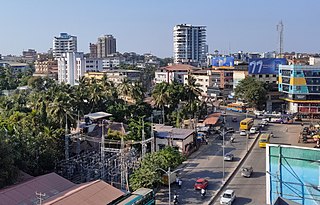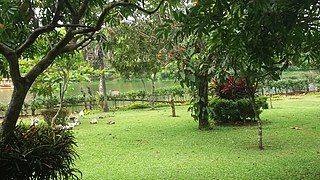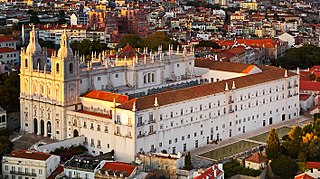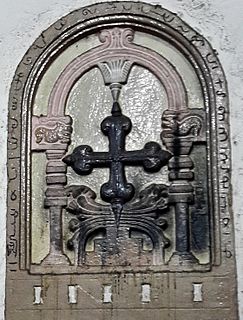This article needs additional citations for verification .(July 2018) |
Alvares tile factory is a Mangalore tile factory in Mangalore. The tiles produced by this factory were in great demand throughout the Indian subcontinent and East Africa.
This article needs additional citations for verification .(July 2018) |
Alvares tile factory is a Mangalore tile factory in Mangalore. The tiles produced by this factory were in great demand throughout the Indian subcontinent and East Africa.
The firm was established in 1878 by Mr. Simon Alvares.

Mangalore, officially known as Mangaluru, is a major port city of the Indian state of Karnataka. It is located between the Arabian Sea and the Western Ghats about 352 km (219 mi) west of Bangalore, the state capital, 20 km north of Karnataka–Kerala border, 297 km south of Goa. Mangalore is the state's only city to have all four modes of transport—air, road, rail and sea. The population of the urban agglomeration was 619,664 according to the 2011 national census of India. It is known for being one of the locations of the Indian strategic petroleum reserves.

Dakshina Kannada is a district of Karnataka state in India, with its headquarters in the port city of Mangalore. It is part of the larger Tulu Nadu region. The district covers an area nestled in between the Western Ghats to its east and the Arabian Sea to its west. Dakshina Kannada receives abundant rainfall during the Indian monsoon. It is bordered by Udupi district to the north, Chikmagalur district to the northeast, Hassan district to the east, Kodagu to the southeast and Kasaragod district of Kerala to the south. According to the 2011 census of India, Dakshina Kannada district had a population of 2,083,625. Dakshina Kannada district is the second major district of Karnataka in all aspects after Bangalore Urban. It is the only district in Karnataka state to have all modes of transport like road, rail, water and air due to the presence of a major hub, Mangalore. This financial district is also known as the Cradle of Indian banking.

The Church or Monastery of São Vicente de Fora, meaning "Monastery of St. Vincent Outside the Walls", is a 17th-century church and monastery in the city of Lisbon, Portugal. It is one of the most important monasteries and mannerist buildings in the country. The monastery also contains the royal pantheon of the Braganza monarchs of Portugal.

The Gokarnanatheshwara Temple, otherwise known as Kudroli Sri Gokarnanatha Kshetra, is in the Kudroli area of Mangalore in Karnataka, India. It was consecrated by Narayana Guru. It is dedicated to Gokarnanatha, a form of Lord Shiva. This temple was built in 1912 by Adhyaksha HoigeBazar Koragappa.

Mangalorean Catholics are an ethno-religious community of Indian Catholics adhering to the Latin Rites of worship, from the Mangalore diocese by the southwestern coast of Carnataca. They are Konkani people and speak the Konkani language.

Pappinisseri is a census town in Kannur district in the Indian state of Kerala. Pappinisseri Panchayat comprises two villages viz Pappinisseri and Aroli. Pappinisseri better known for visha chikitsa kendram
Jeppu is a locality in Mangalore city, Karnataka, India. It is situated on the southern part of Mangalore. Jeppu is on the bank of Nethravathi River. The National Highway 17 (India) passes through this locality.
Bolara or Bolar is an inner city locality in Mangalore City, Karnataka, India.

Industrial and commercial activities dominate Mangalore's economy. It is the only city in Karnataka to have all modes of transport — air, road, rail and sea. The fastest growing non metro in South India is Mangalore. Mangalore is the 2nd largest business centre in Karnataka. Around 75% of India's coffee, timber and cashew nuts exports are handled by the New Mangalore Port. Mangalore is one among the 5 cities in the country to have both a Major Port and an International Airport. Mangalore has some of the tallest buildings in South India, with many more under construction. Mangalore International Airport is among the 2 International Airports in Karnataka, along with Bangalore's Kempegowda International Airport.

Mangalore tiles are a type of tile native to the city of Mangalore, India. Typically considered to be a part of Spanish and Italian architectural styles, the tiles were first introduced to India in 1860 by a German missionary. Since that time, the industry has flourished in India with these red tiles, prepared from hard laterite clay, in great demand throughout the country. They are exported to Myanmar, Sri Lanka, and the Far East and even as far as East Africa, the Middle East, Europe, and Australia. These were the only tiles recommended for government buildings in India under the British Raj.
Albuquerque tile factory is a tile factory located currently at Hoige Bazaar, Bolar, Mangalore, Karnataka, India. It is the only tile factory whose tiles are recommended for Government buildings.
The culture of Mangalorean Catholics has been shaped by their Christianisation in Goa, the the migrations& their captivity. They adopted elements of the local Mangalorean culture, but retained many of their Konkani customs and values. Their traditional houses can be observed in Mangalore, they have spacious porticos, red cement or terra cotta floors and fruit trees around the house.
The History of Mangalorean Catholics comprises three major eras. The first era consists of the cultural heritage shaped by Indo-Aryan migration into the Indus valley, later the migration to Govapuri and other prominent areas of the Konkan region, possibly due to a natural disaster that caused the drying up of the Sarasvati. Also, the various invasions and the political upheavals that followed in the pre-Partition eras of the northwest Indian subcontinent might be responsible for migration to Konkan in Western India. The second era was the legacy of Lusitanian culture, from the conversion of their Konkani ancestors to Roman Catholicism in the colonies of the Portuguese in Goa and Bombay-Bassein, and the final era being the migration of the Roman Catholics in Goa to Mangalore and other parts of South Canara between the mid-16th and mid-18th centuries, forming a unique Mangalorean Catholic identity, and the subsequent growth and development of the community. Several centuries of living in South Canara gave these Catholics an identity of their own.
Mangalorean Protestants are Protestants from South Canara and Coorg districts of the Indian state of Karnataka.
The architecture of Mangalorean Catholics has strong Mangalorean, Italian, and Portuguese influences.
The Common Wealth Trust Ltd or locally referred to as Basel Mission tile factory run by the German missionary Plebot, was the first Mangalore tile manufacturing factory to be set up in India in 1860 on banks of the Nethravathi river near Morgan's Gate, about 10 kilometres (6.2 mi) from the Ullal bridge.

Morgan's Gate is a locality in Mangalore city of Karnataka state in India. It is situated around 4 km southeast to Hampankatta. It is known for the Basel Mission tile factory, founded in 1865. It is close to Mangaladevi Temple in Bolar. Mangalore Club, Mphasis and St. Rita's Church are the other landmarks in the area.
Participation of Mangalorean Catholics in the Indian Independence Movement recounts the community's role in the Indian Independence Movement.

Norma Alvares is an Indian lawyer, social worker and environmental activist.

The Brahmavar Diocese is one among the 30 dioceses of the Malankara Orthodox Syrian Church. The diocese was created in August 2010 by H. H. Baselios Marthoma Didymos I. H. G. Yakob Mar Elias is the current Metropolitan of the diocese. The head office is located in Mount Horeb Bishop's House, Nanthoor, Mangalore, Karnataka